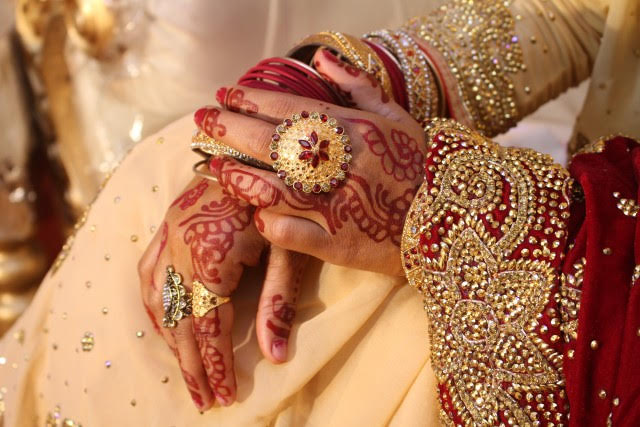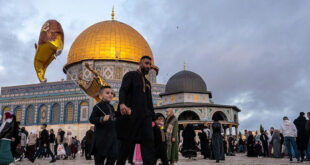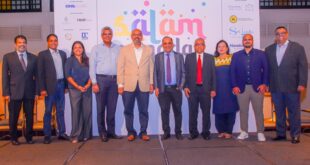 Putting on Henna or Egyptian Privet (Lawsonia Inermis) to form intricate designs on the bride’s hands and feet is an important pre-nuptial custom among all major Muslim communities of the island, be they Moor, Malay, Memon or Bohra.
Putting on Henna or Egyptian Privet (Lawsonia Inermis) to form intricate designs on the bride’s hands and feet is an important pre-nuptial custom among all major Muslim communities of the island, be they Moor, Malay, Memon or Bohra.
The practice is also known among many other Muslim peoples. The custom bears a striking resemblance to the Mehndi Raat (Henna night) of Hindustani tradition and the Laylat-ul-Hinna (Night of the Henna) of the Arabs. It no doubt has a strong Islamic basis for the Prophet of Islam Muhammad ﷺ advised the women of the Ansar (the inhabitants of Medina who welcomed him after his flight from Mecca):
يا نســاء الأنصــار اختضـبن عمســاً ، واختفـضن ولا تنـهـكن ؛ فإنه أحظـى لإناثكن عند أزواجهن
“Oh women of the Ansar! Apply henna and circumcise, but do not exaggerate for it is more pleasing for womenfolk when they are with their husbands” (Mukhtassar zawaid musnad al bazzar, Ibn Hajar)
The practice is known among the Moors as Marutondi Sappadu (Henna feast) and is generally held on the night before the wedding at the residence of the bride. The ceremony involves the application of the moist preparation made with the ground leaves of the Henna to form intricate designs on the bride’s hands and feet and is attended by female relatives of the bride and sometimes of the groom as well.
The bride, attired in appropriate dress, would be seated while the guests would in turns place a bit of marutondi on the fingernails of the bride. Her outstretched palms would also be decorated with intricate designs while her feet are similarly treated. The reddish stains thus formed are considered a beauty mark.
The Marutondi ceremony was formerly also known as Istaadu Sappadu or Throne Feast. In the olden days (upto the 1970s and 1980s) when weddings invariably took place in the bride’s home, it was the practice to install a raised platform somewhat in the form of a throne known as istadu (a word of Portuguese origin) well before the actual wedding took place. It was on this throne that the girl would be seated and the henna applied.
In certain conservative areas of Colombo such as Dematagoda and Maligawatte, a special meal known as Pacchor Sappadu consisting of milk-rice, beef or chicken curry and mashi sambal (Maldive fish sambol) would be offered to visitors on the evening before the day of the wedding. Sweetmeats such as dodol (a dark brown oily sweetmeat), dosi (sweet fruit preserves) and savvarsi maskat (sago muscat) would also figure in this meal, washed down by copious quantities of special coffee mixed with cardamom seed, a most refreshing brew. The ceremony was formerly known as Singasanam Sappadu after the singasanam or ornate bridal throne which was set up in the bride’s residence on this day.
In the Eastern districts like Amparai, the sammandis or those families related by marriage would bring to the bride alati on the morning of the wedding. The alati comprises of a metal stand of about one to one-and-a-half feet containing metal rods arranged in a pyramidal fashion to which are attached coloured pebbles and paper.
The henna would be brought in a small dish to be applied on the bride’s hands for the wedding that will take place that evening. Although this custom was widely practiced in the olden days, it has declined of late though it is still said to be practiced in some areas.
We were also informed that in Jaffna, the ceremony simply known as marutondi poduradu (Putting on henna) took place not in the evening or night preceding the day of marriage but in the afternoon
Extracted from Serendib Culture Club FB Page (Courtesy: Asiff Hussein)
Post Disclaimer | Support Us
Support Us
The sailanmuslim.com web site entirely supported by individual donors and well wishers. If you regularly visit this site and wish to show your appreciation, or if you wish to see further development of sailanmuslim.com, please donate us
IMPORTANT : All content hosted on sailanmuslim.com is solely for non-commercial purposes and with the permission of original copyright holders. Any other use of the hosted content, such as for financial gain, requires express approval from the copyright owners.
 Sri lanka Muslims Web Portal Sri Lanka Muslims News Center
Sri lanka Muslims Web Portal Sri Lanka Muslims News Center
 Donate
Donate


